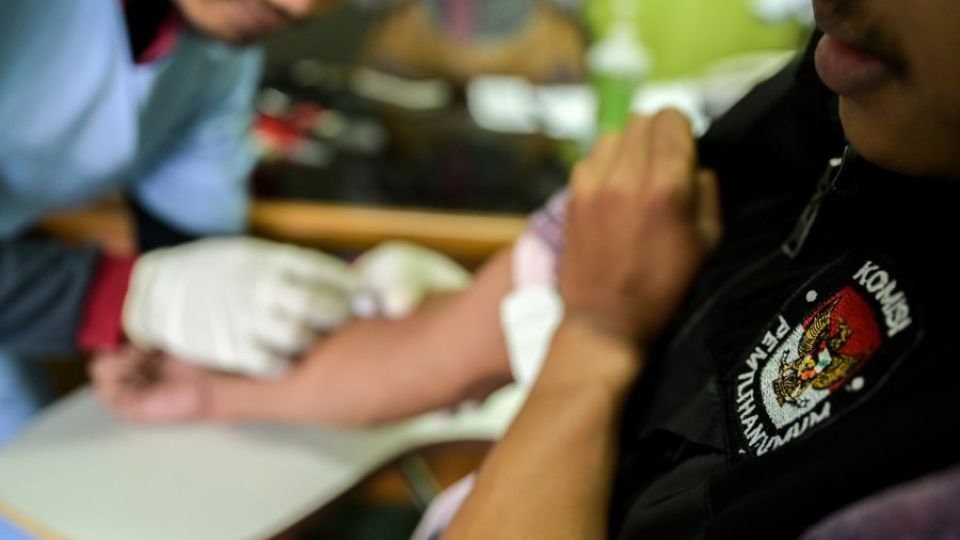February 15, 2024
JAKARTA – The Health Ministry is preparing thousands of first responders and extending health centers’ operational hours during election day on Wednesday and during the vote count in an effort to avoid a repetition of the high death toll among poll workers in the previous election.
Wednesday will be voting day for nearly 205 million citizens, when voters will choose their preferred presidential, as well as national and regional legislative, candidates.
The General Elections Commission (KPU) has recruited 5.7 million local poll administrators (KPPS) to work in 820,000 polling stations across the country. Each polling station is expected to prepare, distribute and count thousands of ballot papers throughout the day.
“The success of the elections [relies] on all poll administrators. If they can do their jobs well, we hope that the voting and vote-counting process will also go well,” Health Ministry Primary Healthcare Director Obrin Parulian said in a podcast on Feb. 5.
“They need to be healthy before, during and after [election day],” he continued.
The ministry has published a circular, detailing measures to ensure the country’s health infrastructure is ready to assist poll workers throughout the polling day. The efforts include extending the operational hours of community health centers (Puskesmas) to 24 hours and fitting them with psychological counseling services.
“We’ll [make sure] that all facilities are ready. Puskesmas and hospitals will also be ready to provide services throughout the elections,” Obril said.
The Health Ministry will not assign health workers to each individual polling station. Instead, local health agencies have mapped out where health workers and ambulances should be stationed to cover several polling stations at a time, said Obrin.
The ministry has also readied some 13,000 first responders, including 468 medical emergency teams, as part of its public safety center (PSC) for Wednesday’s vote, said Sumarjaya, who heads the ministry’s health crisis division.
“The PSC team will be the ones [providing] a quick response at the polling stations should anything go wrong,” Sumarjaya said, adding that the first responders would refer sick people to a nearby Puskesmas or hospital.
Tighter requirements
Health authorities are pushing for such intensive measures to prevent KPPS from falling ill and dying, as happened after the 2019 election.
The election five years ago, during which around 80 percent of the 192 million registered voters went to the polls, saw around 6,000 poll administrators fall sick and nearly 900 die throughout the election period.
Among the biggest factors in the death toll were the fact that most poll workers in 2019 were elderly and people with comorbidities, who had to work for long hours in high-stress environments, according to Nida Rohmawati, the ministry’s director of health for productive age and the elderly.
Keen to avoid a repeat, the KPU introduced this year new requirements for poll worker applicants, such as limiting the age to 55 years old and a mandatory medical check-up.
The election organizer worked closely with the ministry and the Health Care and Social Security Agency (BPJS Kesehatan) throughout the check-up process, Nida said.
“As part of the check-up process their vitals, including blood pressure and blood sugar levels [were checked], since these were the main risk factors behind the illnesses and deaths during the previous election,” she continued, adding that the health workers also assessed the applicants’ mental health conditions.
According to BPJS Kesehatan, it has received the complete medical data of around 2.2 million poll workers as of Feb. 7, with more expected to be submitted by the voting day on Wednesday. Of the total figure, around 90 percent of the KPPS were categorized as not being at any health risk.
However, only 1.4 million, or 63 percent of all poll administrators, have active accounts in the National Health Insurance (JKN) program. The rest either have inactive accounts or are not registered at all.
The ministry has also urged poll workers to ensure they are well-rested, drink and eat accordingly and do regular physical exercise throughout the voting and vote counting period.
Despite the preventive measures, officials reported that at least three poll workers have died: two in Pidie, Aceh, and another in Magetan, East Java.
The poll worker in Magetan, identified as 41-year-old civil servant Rita Setyaningsih, died on Sunday after attending a meeting with other KPPS, as kompas.com reported.
Her family claimed that Rita, who had a medical history of hypertension, died of exhaustion. Magetan election commission head Fahrudin acknowledged that Rita had attended several pre-election meetings since Friday, but he dismissed that the election-related agenda had caused her death, claiming that she had had enough time to rest at home between the meetings.


